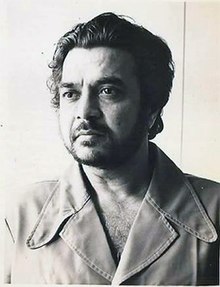Satyadev Dubey
Satyadev Dubey | |
|---|---|
 | |
| Born | (1936-07-13)13 July 1936 Bilaspur, Central Provinces, British India |
| Died | 25 December 2011(2011-12-25) (aged 75) Mumbai, Maharashtra, India |
| Other names | Pt. Satyadev Dubey |
| Awards | 1971 Sangeet Natak Akademi Award 1978 National Film Award for Best Screenplay: Bhumika |
Satyadev Dubey (13 July 1936[1] – 25 December 2011)[2] was an Indian theatre director, actor, playwright, screenwriter, and film actor and director. He was awarded the Sangeet Natak Akademi Award in 1971.[3]
He won the 1978 National Film Award for Best Screenplay for Shyam Benegal's Bhumika and 1980 Filmfare Best Dialogue Award for Junoon. In 2011, he was honoured with the Padma Bhushan by the Government of India.
Contents
1 Biography
2 Filmography
3 References
4 External links
Biography
Satyadev Dubey was born in Bilaspur district of the Madhya Pradesh now in Chhattisgarh in 1936. He moved to Mumbai with the aim of becoming a cricketer, but ended up joining the Theatre Unit, a theatre group run by Ebrahim Alkazi, which also ran a school for many budding artists. Later when Alkazi left for Delhi to head the National School of Drama, he took over the Theatre Unit, and went on to produce many important plays in the Indian theatre.
He produced Girish Karnad's first play Yayati, and also his noted play Hayavadana, Badal Sarkar's Ewam Indrajit and Pagla Ghoda, Chandrashekhara Kambara’s Aur Tota Bola (Jokumaraswamy in original Kannada), Mohan Rakesh’s Aadhe Adhure, Vijay Tendulkar’s Khamosh! Adalat Jaari Hai, and A Raincoat For All Occasions and Jean Anouilh's Antigone in 2007.
He is credited with the discovery of Dharmavir Bharati’s Andha Yug, a play that was written for radio; Dubey saw its potential, sent it across to Ebrahim Alkazi at National School of Drama. When staged in 1962, Andha Yug brought in a new paradigm in Indian theatre of the times.[4][5]
He made two short films Aparichay ke Vindhachal (1965) and Tongue In Cheek (1968),[6] and directed a Marathi feature film, Shantata! Court Chalu Aahe (1971), based on Vijay Tendulkar's play, which in turn is based on Friedrich Dürrenmatt's story "Die Panne".
Filmography
Shantata! Court Chalu Aahe - 1971 - Direction
Ankur - 1974 - Dialogue, Screenplay
Manzilein Aur Bhi Hain - 1974 Dialogue
Nishant - 1975 - Dialogue
Bhumika 1977 - Dialogue, Screenplay
Junoon - 1978 - Dialogue
Kalyug - 1980 - Dialogue
Aakrosh - 1980 - Dialogue
Vijeta - 1982 - Dialogue, Screenplay
Mandi - 1983 - Screenplay
Bharat Ek Khoj (TV Series) - 1988 - Acting (as Chanakya)
References
^ http://www.bombaytimes.com/theatre/theatrewallas-come-together-to-pay-tribute-to-satyadev-dubey-/articleshow/59526002.cms
^ Dubey, Bharti (25 December 2011). "Satyadev Dubey, noted theatre personality, passes away". The Times of India. Mumbai. Retrieved 6 December 2012..mw-parser-output cite.citation{font-style:inherit}.mw-parser-output .citation q{quotes:"""""""'""'"}.mw-parser-output .citation .cs1-lock-free a{background:url("//upload.wikimedia.org/wikipedia/commons/thumb/6/65/Lock-green.svg/9px-Lock-green.svg.png")no-repeat;background-position:right .1em center}.mw-parser-output .citation .cs1-lock-limited a,.mw-parser-output .citation .cs1-lock-registration a{background:url("//upload.wikimedia.org/wikipedia/commons/thumb/d/d6/Lock-gray-alt-2.svg/9px-Lock-gray-alt-2.svg.png")no-repeat;background-position:right .1em center}.mw-parser-output .citation .cs1-lock-subscription a{background:url("//upload.wikimedia.org/wikipedia/commons/thumb/a/aa/Lock-red-alt-2.svg/9px-Lock-red-alt-2.svg.png")no-repeat;background-position:right .1em center}.mw-parser-output .cs1-subscription,.mw-parser-output .cs1-registration{color:#555}.mw-parser-output .cs1-subscription span,.mw-parser-output .cs1-registration span{border-bottom:1px dotted;cursor:help}.mw-parser-output .cs1-ws-icon a{background:url("//upload.wikimedia.org/wikipedia/commons/thumb/4/4c/Wikisource-logo.svg/12px-Wikisource-logo.svg.png")no-repeat;background-position:right .1em center}.mw-parser-output code.cs1-code{color:inherit;background:inherit;border:inherit;padding:inherit}.mw-parser-output .cs1-hidden-error{display:none;font-size:100%}.mw-parser-output .cs1-visible-error{font-size:100%}.mw-parser-output .cs1-maint{display:none;color:#33aa33;margin-left:0.3em}.mw-parser-output .cs1-subscription,.mw-parser-output .cs1-registration,.mw-parser-output .cs1-format{font-size:95%}.mw-parser-output .cs1-kern-left,.mw-parser-output .cs1-kern-wl-left{padding-left:0.2em}.mw-parser-output .cs1-kern-right,.mw-parser-output .cs1-kern-wl-right{padding-right:0.2em}
^ "Theatre guru Satyadev Dubey passes away". The Hindu. Mumbai. 25 December 2011. Retrieved 6 December 2012.
^ Karnad, Girish (25 November 2007). "Drama with a distinct vision". The Hindu. Retrieved 6 December 2012.
^ Dutt, Devina (16 November 2008). "'Reaction matters to me'". The Hindu. Retrieved 6 December 2012.
^ "One stage to another". The Telegraph. Calcutta. 7 November 2005. Retrieved 6 December 2012.
External links
Satyadev Dubey on IMDb
"The Fury And The Ecstacy". 5 (45). Tehelka. 15 November 2008.

Comments
Post a Comment